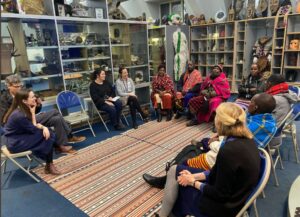GEM Conference 2022 // Reconnecting Handling Collections: Schools Learning in Partnership
Handling collections are powerful resources for learning and for connecting museums to audiences... but are we always using them responsibly?
The Horniman Museum and Garden’s vast Handling Collection of 3,500 objects has formed the backbone of our successful schools programme for over 30 years. The collection was built with sporadic purchases, deaccessioned objects, and donations. Objects are often made in traditional ways and reflect a bygone way of life (food preparation, survival in extreme temperatures, traditional clothing), yet through our workshops, these objects become the tangible representations of people across the world… we risk sharing reductive and outdated portrayals of these ever-changing communities.

If we truly believe in the significance of object based learning – that hands on experiences are memorable and can even be defining – we have a moral and ethical responsibility to get the objects right. We cannot do this without meaningful, properly paid consultation and collecting with connected communities.
The Horniman’s Learning Team has been working in partnership with our Anthropology curators to overhaul the ways we understand and use our Handling Collection. Through advocacy, unification within a new ‘Content’ team, and the fantastic work of India Patel in a new ‘Schools and Handling Collection Assistant’ role, our Handling Collection is increasingly considered alongside the Museum’s permanent collections for project work. This joined-up approach has enabled us to begin to embed evolving curatorial practice within our learning programmes, ensuring community consultation, research and voices run through our school workshops.
As part of Community Action Research: African and Caribbean Collections, Handling Collection objects were selected for research by community members living in the UK. Our team then worked with researcher, Scherin Barlow Massay, to co-produce a learning resource ‘Afrikan-Caribbean Masquerade’ that presents her research for primary school-aged learners.
Through Rethinking Relationships: Kenyan community research, Community Researcher Ken Simiyu conducted in-depth research of Kenyan objects in our Handling Collection. He then supported us to review the workshops in which they were used, before identifying, researching and ethically acquiring new objects.

In 2019, the Learning Team had the opportunity to show visiting Maasai community leaders Maasai objects in the Handling Collection, and to discuss their use. As a result of these conversations, we acquired objects that the leaders felt were missing, corrected misinformation, and centred their descriptions and explanations of objects in our workshops.
Most recently, we became a partner on the AHRC funded project ‘Egypt’s Dispersed Heritage’. With project researcher Heba Abd el-Gawad, we have overhauled our ancient Egypt workshop and introduced modern Egyptian perspectives, cartoons by Nasser Junior, newly acquired objects, and reflective conversations about the ethics of handling dispersed grave goods.
The Horniman’s Schools programme and Handling Collection are vast, and we are very much at the beginning of this redevelopment. However we hope that by prioritising this work, we can begin to subvert the colonial misconception that museum staff are – and should be – experts. We need to be honest about the work we do, reflective, open to radical change, and understand that our ethical responsibility is as important as that of curatorial teams.
Lucy Maycock, Schools Learning Manager, Horniman Museum and Gardens
Lucy Maycock is proud to be Schools Learning Manager at South London’s Horniman Museum and Gardens, ArtFund Museum of the Year 2022, where she has worked in various roles for the last seven and a half years. She is passionate about object-based learning, co-creating programmes with communities, and creating paid, entry-level opportunities within the sector.

I would like to know how to join with the project for heritage